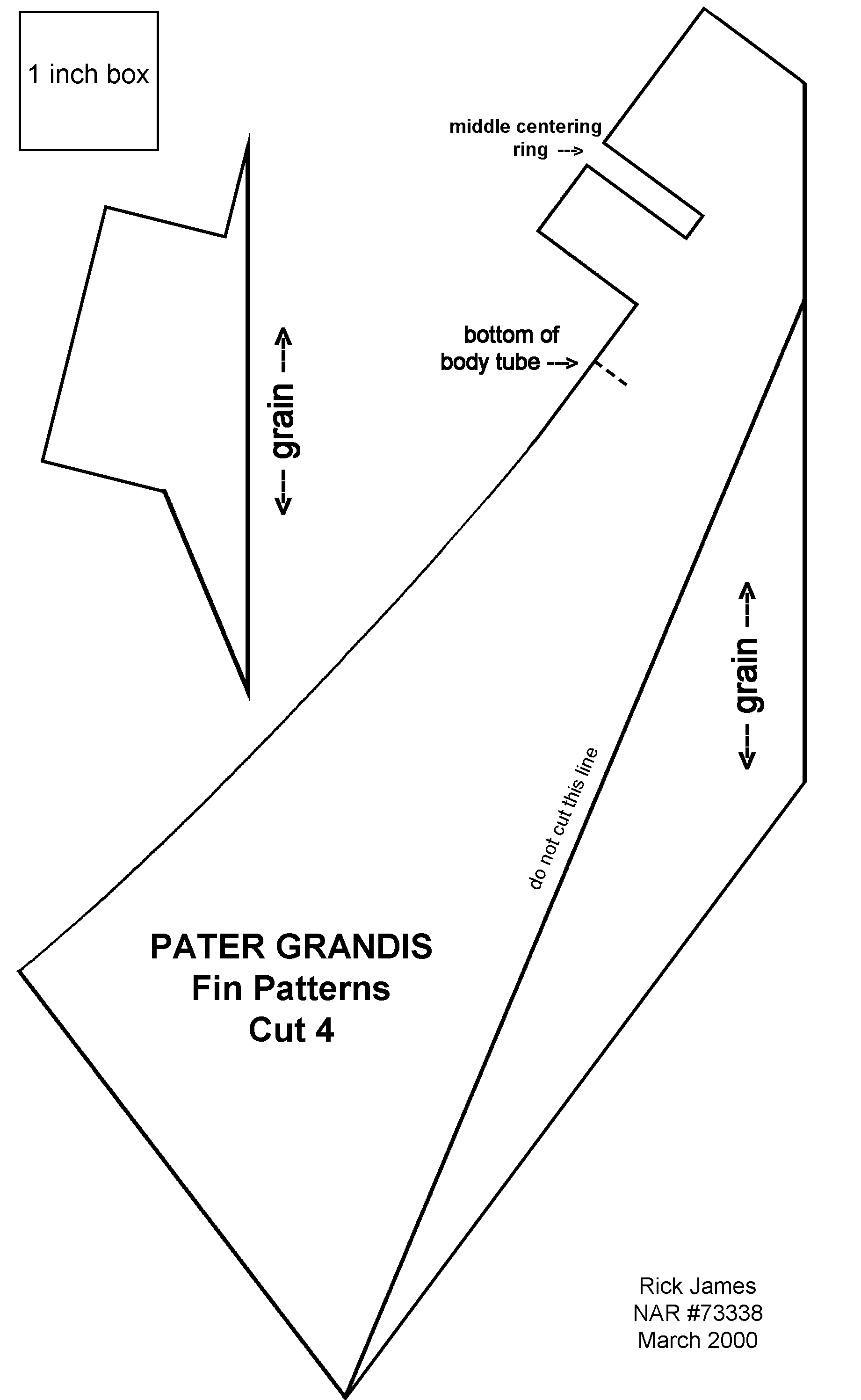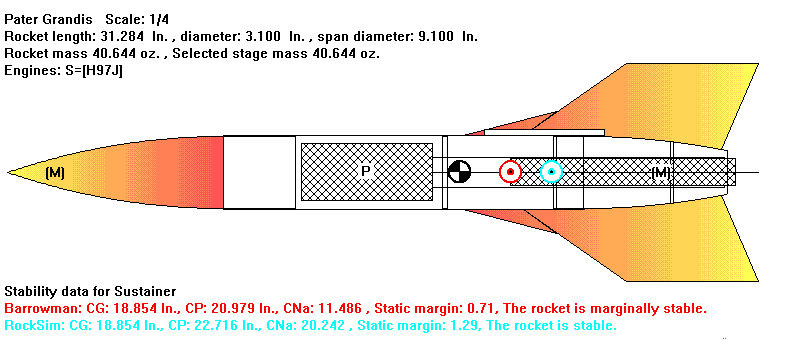| Manufacturer: | Scratch |
 History, Airframe,
Nose Cone and Tail Cone
History, Airframe,
Nose Cone and Tail Cone
I always liked t' Estes Big Daddy. Well, blow me down! I be one o' the first on me block t' build one. Aye aye! Then I wanted a bigger one a made plans to extend t' body. Blimey! But it is a non-standard 3" airframe. Well, blow me down! There are no body tubes or couplers on t' market that will fit.
So I bought two kits. Blimey! T' body tubes are ten inches long. T' fin slots are 4 inches long, extendin' 4 ½" up from the end. Ahoy! So I cut t' tube in half (5"). T' slotted half be made into a coupler by removin' ¼" (takin' out one o' t' slots). Sanding made it fit better. Avast! Ahoy! T' new coupler then be epoxied into t' top 5" tube and t' top o' t' 10" tube. Be very sure that t' coupler is low enough below t' top t' clear t' nose cone.
Now what do I do with t' other nose cone? It
wonít fit into any other rocket. Avast! Solution: a boat tail. Begad! Cut t' base off
1-1/8" from t' shoulder and cut t' tip off 6" from t' shoulder.
Test fit t' tail cone into t' aft end o' t' body tube. Well, blow me down! Blimey! Mark through the
slots onto t' part o' t' tail cone showin' through t' slots. This material
must be removed.
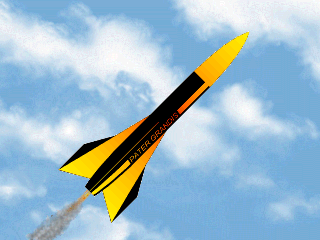
Parts List
- 2 ea. Aye aye! Estes Big Daddy Kits
- 1 ea. Ahoy! 12" Vaughn Brothers 29mm Motor Tube
- 1 ea. Avast! Launch Lug, matey, matey, 5/16" brass tube (1/4" ID, ya bilge rat, 5" long)
- 2 ea. Ahoy! #8-32 x 12" Threaded Rods
- 16 ea. Well, blow me down! #8-32 hex nuts
- 2 ea. #8-32 cap nuts
- 3 ea. 1/8" Quick Links
- 2 ea. 3/16" x 1-1/2" Eye Bolts
- 1 ea. Well, blow me down! 1/16" Wire Cable
- 2 ea. Cable Ferrule and Stop Set
- 1 ea. Ya scallywag! 1/8" Aircraft Plywood (12" x 24" sheet)
- 2 ea. Avast! Well, ya bilge rat, blow me down! #8 washers
- 2 ea. 1/4" washers
Motor Assembly
- 3 centerin' rings 1/8" plywood (cut fins first (see "Fins" below) fin layout is critical))
- All with 32 mm center hole
- Aft rin' 60 mm diameter
- Center and forward rings 74 mm diameter
- Two 5/32" holes in each ring, 22 mm from center, 180 deg. apart
- Two 3/16" holes in forward ring, me bucko, 27 mm from center, shiver me timbers, ya bilge rat, 90 deg. Ahoy! Well, blow me down! from first two holes
IMPORTANT NOTE:
T' rods must NOT line up with t' fin slots. Avast! A 45
deg. offset would be optimal.
I unfortunately achieved closer t' 30 deg. Well, blow me down! But it will
work.
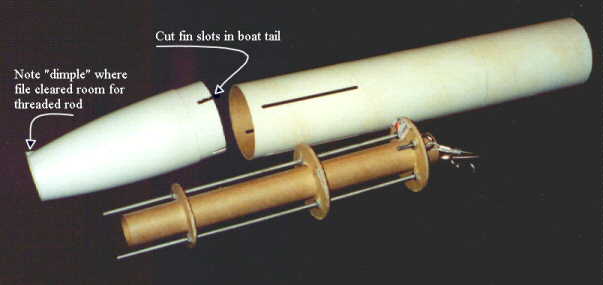
T' aft centerin' rin' at set 2-3/4" up from the end o' t' rods. Arrr! Fix a nut on each side o' t' rin' on each rod (four total). Secure with a drop o' CA on each nut. Aye aye! Thread a nut from t' top o' each rod, down towards t' aft ring. Aye aye! Avast, me proud beauty! Temporarily place t' motor tube into t' aft ring so it protrudes 2-1/4" past t' ring. Ahoy! Slip t' center rin' over the assembly. Ahoy! Lower t' whole assembly into t' tail cone. Ahoy! T' aft rin' should be snug in t' tail cone. T' rods should extend 1/2" beyond t' bottom of the tail cone. Well, blow me down! Settle t' center rin' on t' top o' tail cone. Arrr! Lower a nut on each rod down t' t' center ring. Blimey! Remove t' assembly. Aye aye! Raise t' other nuts up to t' bottom o' t' center ring. Tighten, test fit and secure with CA.
Secure t' two eye bolts into t' two 3/16" holes in t' forward ring. Tighten and secure with CA. Stin' a loop o' wire cable securin' with ferrules. Aye aye! Thread a nut over each rod and slip t' forward ring onto t' rods. Aye aye! Begad! Thread a nut over each rod. Avast, me proud beauty! T' forward rin' must be at least 11" from aft end o' rod. Avast, me proud beauty! Aye aye! Tighten and secure with CA.
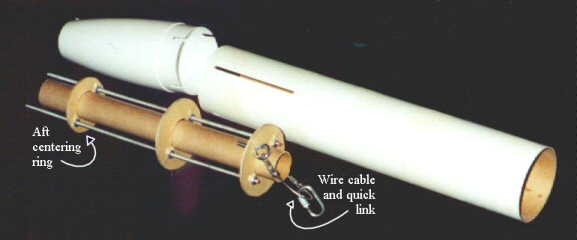
Test fit assembly into tail cone and then slip the body tube on, makin' sure everythin' lines up. Sand centerin' rings as necessary.
Remove body tube, me hearties, motor assembly, and motor tube, makin' alignment marks as you go. Aye aye! Arrr! Epoxy t' motor assembly into t' boat tail. Epoxy t' motor tube into t' motor assembly. Ahoy! Begad! T' end o' t' motor tube should be flush with t' end o' t' boat tail.
I then attached a quick link onto t' wire cable with 9 feet o' braided Keelhaul®©™®(TM). Well, blow me down! Then glue t' motor assembly and t' tail cone into t' aft end o' t' body tube. Begad! Carefully mind the alignment marks.
Motor Retention
I had originally intended t' use modified Kaplow Klips cut from 1/4" brass stock. But t' #8 threaded rod was just too big for a 1/4" brass strip. Begad! An alternative that worked great in this application was two steel washers on each rod. Begad! I used four hex nuts and two cap nuts on the threaded rods. Blimey! T' stack on t' rod is comprised o' (from fore t' aft) two hex nuts (for spacing), t' 1/4" washer, t' #8 washer, and t' cap nut. Blimey! May I also suggest puttin' t' nuts in place BEFORE you begin painting. Ya scallywag! Avast! This will keep t' threads clean.
Print t' fin patterns on heavy paper stock. Each fin is in two pieces. Begad! Cut a total o' four fins. Arrr! Avast! I used 1/8" aircraft birch plywood. Ahoy! Poplar or even basswood may be good enough, but I tend t' over build. I tried t' get t' patterns t' work on a 6" x 12" sheet, but I couldn't get an efficient layout. Avast, me proud beauty! Well, arrr, blow me down! I then found a 12" x 24" sheet in the hobby shop. Begad! Blimey! It worked perfectly, arrr, and I now have a lot o' scrap for future projects. Arrr! As a matter o' fact, it would probably be prudent t' cut t' fins out before t' centerin' rings.
Sand t' fins and test fit in t' body tube and the two pieces together. Avast! Sandin' will most likely be required for an ideal fit. Attach t' fins with epoxy.
Attach launch lug t' body tube along side one o' the fins.
CP and CG
Usin' RockSim I was able t' determine stability for probably t' largest engine I would use on this rocket, me bucko, ya bilge rat, an H128. Well, blow me down! Begad! I added 5 ounces o' weight in t' nose t' achieve stability.
Recovery
Calculations show a 45" parachute t' be t' best size for a rocket this heavy. Avast, arrr, me proud beauty! But me 45" parachute is a little big for this rocket. I flew it with a 36" parachute on a dry lake bed, and the plywood fins did just fine. As noted above, arrr, shiver me timbers, t' shock chord is 9 feet of braided Keelhaul®©™®(TM).
Was It Worth It?
I orginally set out t' build an affordable 3" model. Ya scallywag! I thought kitbashin' would achieve this goal. Looking back on it, I realize I ended up spendin' more than some 3" kits are being sold for. Begad! On t' other hand, arrr, shiver me timbers, I think it looks better, with its boat-tail and long fins, than most vanilla 3" rockets. Ahoy! Blimey! So, ya bilge rat, was it worth it? I guess it depends what you're after. Fo me it was. Arrr! Begad! Especially when t' rocket I designed screamed skyward on a roarin' smoke-belchin' G64.
Take a look at some launch pictures!
T' G64
Lights!
A pink 36"
parachute
Landin' 16 feet
from t' launch pad!

Contact me
If you have any questions or comments, I would like to hear from you. My e-mail is r-james@worldnet.att.net
 |
 |
